artists
 Samia Mahbub Ahmad (vocalist) a Hindustani (North Indian) classical vocalist who has received her apprenticeship over the last two decades from Sri Tapan Kanti Baidya, a pioneer of this genre of music in Bangladesh and Vidushi Sumitra Guha (Padma Shri awardee), one of India’s premier classical vocalists. Samia has leveraged her classical base to also specialize in Nazrul Sangeet, Bhajans, and global fusion
Samia Mahbub Ahmad (vocalist) a Hindustani (North Indian) classical vocalist who has received her apprenticeship over the last two decades from Sri Tapan Kanti Baidya, a pioneer of this genre of music in Bangladesh and Vidushi Sumitra Guha (Padma Shri awardee), one of India’s premier classical vocalists. Samia has leveraged her classical base to also specialize in Nazrul Sangeet, Bhajans, and global fusion
Visit: www.samiaclassicalmusic.com/hindustani_samia_mahbub_ahmad.cfm
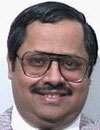 Arvind Bhand (Harmonium) is an accomplished Harmonium player and teacher in Washington DC area. He started learning harmonium accompaniment at the age of ten. He has played with several luminaries in the field of Indian classical and semi-classical music, as well as with original scores of light music. He is essentially self-taught, and has to his credit successful concert tours in the U.S. as well as in India as a harmonium accompanist.
Arvind Bhand (Harmonium) is an accomplished Harmonium player and teacher in Washington DC area. He started learning harmonium accompaniment at the age of ten. He has played with several luminaries in the field of Indian classical and semi-classical music, as well as with original scores of light music. He is essentially self-taught, and has to his credit successful concert tours in the U.S. as well as in India as a harmonium accompanist.
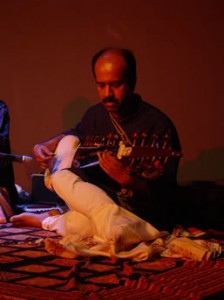 Soumya Chakraverty (Sarod) plays the traditional Indian fretless stringed lute, or the Sarod. He was initiated into this instrument in his early years and started learning under the guidance of Samarendra Sikdar, a noted Sarodia himself and part of the oldest schools of instrumental music in northern India. Soumya has trained with his guru for over 31 years and has matured into a senior exponent of this beautiful instrument. In addition to teaching and performing in the true traditional style, Soumya has also collaborated with other forms of Indian and world music, such as Carnatic (South Indian), Flamenco, and modern Jazz.
Soumya Chakraverty (Sarod) plays the traditional Indian fretless stringed lute, or the Sarod. He was initiated into this instrument in his early years and started learning under the guidance of Samarendra Sikdar, a noted Sarodia himself and part of the oldest schools of instrumental music in northern India. Soumya has trained with his guru for over 31 years and has matured into a senior exponent of this beautiful instrument. In addition to teaching and performing in the true traditional style, Soumya has also collaborated with other forms of Indian and world music, such as Carnatic (South Indian), Flamenco, and modern Jazz.
Visit: www.sarodia.com/soumya_chakraverty
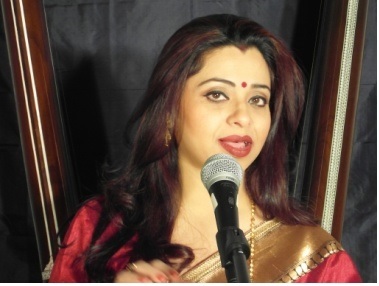 Sarbari Gangopadhyay (Vocalist) is a Hindustani Classical vocalist of the Rampur Sahaswan gharana. She learnt Khayal, Thumri and Bhajan from Pandit Arun Bhaduri and Smt. Girija Devi and got training in Dhrupad from Ustad Faiyaz Wasifuddin Dagar. She also has training in Tabla from Pandit Samir Chatterjee. Sarbari was the gold medalist in the Master’s examinations in Music in Rabindra Bharati University and got the prestigious title of ‘Surmoni’ from Mumbai, India. She currently resides in Ashburn in Northern Virginia and regularly gives Hindustani Classical and semi Classical song performances across North America. Her performances in New York, New Jersey, Maryland and Virginia have gotten high recognition from connoisseurs of Indian Classical music. Sarbari is the founder Director of the Aradhana School of Music (Ashburn, VA) that propagates the learning of Hindustani Classical music. She teaches Hindustani Classical and light Classical music in the Northern Virginia and Maryland area and also provides online vocal training classes for students across the country. http://www.sarbarigangopadhyay.webs.com/
Sarbari Gangopadhyay (Vocalist) is a Hindustani Classical vocalist of the Rampur Sahaswan gharana. She learnt Khayal, Thumri and Bhajan from Pandit Arun Bhaduri and Smt. Girija Devi and got training in Dhrupad from Ustad Faiyaz Wasifuddin Dagar. She also has training in Tabla from Pandit Samir Chatterjee. Sarbari was the gold medalist in the Master’s examinations in Music in Rabindra Bharati University and got the prestigious title of ‘Surmoni’ from Mumbai, India. She currently resides in Ashburn in Northern Virginia and regularly gives Hindustani Classical and semi Classical song performances across North America. Her performances in New York, New Jersey, Maryland and Virginia have gotten high recognition from connoisseurs of Indian Classical music. Sarbari is the founder Director of the Aradhana School of Music (Ashburn, VA) that propagates the learning of Hindustani Classical music. She teaches Hindustani Classical and light Classical music in the Northern Virginia and Maryland area and also provides online vocal training classes for students across the country. http://www.sarbarigangopadhyay.webs.com/
 Alif Laila (Sitar) was born and raised in Dhaka, Bangladesh. Her connection with the arts was very deep since early childhood. After initial training in vocal music, she was eventually was inspired to learn the sitar by her mother, Shehida, in Dhaka, Bangladesh. She was trained on a ‘one to one’ basis in the techniques and compositions of the classical music by Ustad Mir Qasem Khan, nephew of Ustad Allauddin Khan, founder of the Senia Maihar school of music. Alif was fortunate to receive guidance from teachers like Partha Chatterjee and Krishna Bhatt and blessings from Ustad Ali Akbar Khan. She has performed extensively in many prestigious venues in Bangladesh, India and the USA.World renowned tabla artists like Pandit Anindo Chatterjee, Ustad Taari Khan has recorded with her.
Alif Laila (Sitar) was born and raised in Dhaka, Bangladesh. Her connection with the arts was very deep since early childhood. After initial training in vocal music, she was eventually was inspired to learn the sitar by her mother, Shehida, in Dhaka, Bangladesh. She was trained on a ‘one to one’ basis in the techniques and compositions of the classical music by Ustad Mir Qasem Khan, nephew of Ustad Allauddin Khan, founder of the Senia Maihar school of music. Alif was fortunate to receive guidance from teachers like Partha Chatterjee and Krishna Bhatt and blessings from Ustad Ali Akbar Khan. She has performed extensively in many prestigious venues in Bangladesh, India and the USA.World renowned tabla artists like Pandit Anindo Chatterjee, Ustad Taari Khan has recorded with her.
Visit: www.aliflailasitar.com and https://sitarniketan.viewcy.com/
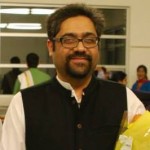 Arijit Mahalanabis (Vocal Dhrupad) is among a small number of artists to have achieved fluency in the four disciplines of Hindustani vocal music: Dhrupad and Dhamar, Khayal, Thumri, and Tappa. A prolific teacher, he founded and ran the Seattle Indian Music Academy between 2008 and 2013 and continues to maintain an active teaching practice in Seattle. Now based on the East Coast, Arijit has performed all over the country, as well as in India, to high acclaim. Stylistically Arijit’s music is based in the Dagar Bani and the Agra Gayaki, but he is deeply influenced by both Gwalior and Jaipur Gharanas. A composer and a director of choral music as well, Arijit’s production of Mahishasura Mardini in 2011 received praise both in the U.S. and India.
Arijit Mahalanabis (Vocal Dhrupad) is among a small number of artists to have achieved fluency in the four disciplines of Hindustani vocal music: Dhrupad and Dhamar, Khayal, Thumri, and Tappa. A prolific teacher, he founded and ran the Seattle Indian Music Academy between 2008 and 2013 and continues to maintain an active teaching practice in Seattle. Now based on the East Coast, Arijit has performed all over the country, as well as in India, to high acclaim. Stylistically Arijit’s music is based in the Dagar Bani and the Agra Gayaki, but he is deeply influenced by both Gwalior and Jaipur Gharanas. A composer and a director of choral music as well, Arijit’s production of Mahishasura Mardini in 2011 received praise both in the U.S. and India.
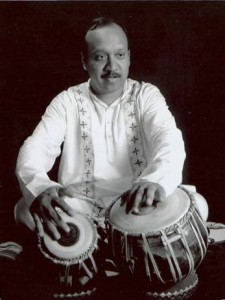 Devapriya ‘Debu’ Nayak (Tabla) was born in West Bengal, India, and began learning tabla at the age of three from his grandfather, Chaudhury Kausalya Nandan, who was an accomplished pakhawaj and tabla player of the Punjab Gharana. Later, Debu became a disciple of Pt. Radhakanta Nandi of the Benaras Gharana. In 1981, Debu came to the US to pursue higher studies and continued his tabla taalim from Maestros like Ustad Zakir Hussain , Pandit Anindo Chattergee and Pt. Samir Chatterjee. He is also the director of the Washington DC Chapter of Chhandayan, a tabla school dedicated to the promotion of tabla and Indian Classical Music in the Washington DC metro area.
Devapriya ‘Debu’ Nayak (Tabla) was born in West Bengal, India, and began learning tabla at the age of three from his grandfather, Chaudhury Kausalya Nandan, who was an accomplished pakhawaj and tabla player of the Punjab Gharana. Later, Debu became a disciple of Pt. Radhakanta Nandi of the Benaras Gharana. In 1981, Debu came to the US to pursue higher studies and continued his tabla taalim from Maestros like Ustad Zakir Hussain , Pandit Anindo Chattergee and Pt. Samir Chatterjee. He is also the director of the Washington DC Chapter of Chhandayan, a tabla school dedicated to the promotion of tabla and Indian Classical Music in the Washington DC metro area.
Visit: www.tablaguy.com/home.html
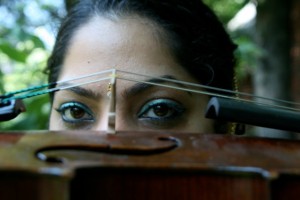 Nistha Raj (Violin) is a performer/teacher of North Indian (Hindustani) Classical Violin. Although born and raised in the U.S., because of her Indian heritage, she was exposed to the classical music of India from her childhood and had an intense desire to delve deeper into a study of the music. In 2005, Nistha was awarded a scholarship from the Indian Council for Cultural Relations to undergo rigorous, intensive formal training in Hindustani violin at the Gandharva Maha Vidyalaya in India. The ICCR grants 100 scholarships to foreign nationals from over 70 countries to study Indian music, dance, and art. Nistha was solely selected from the United States to study Hindustani Violin. She has performed in many cultural festivals in DC and is the recipient of multiple grants from the DC Commission on the Arts and Humanities. Nistha feels a deep affinity for Indian classical music and her lifelong pursuit is to discover the unending beauty within it.
Nistha Raj (Violin) is a performer/teacher of North Indian (Hindustani) Classical Violin. Although born and raised in the U.S., because of her Indian heritage, she was exposed to the classical music of India from her childhood and had an intense desire to delve deeper into a study of the music. In 2005, Nistha was awarded a scholarship from the Indian Council for Cultural Relations to undergo rigorous, intensive formal training in Hindustani violin at the Gandharva Maha Vidyalaya in India. The ICCR grants 100 scholarships to foreign nationals from over 70 countries to study Indian music, dance, and art. Nistha was solely selected from the United States to study Hindustani Violin. She has performed in many cultural festivals in DC and is the recipient of multiple grants from the DC Commission on the Arts and Humanities. Nistha feels a deep affinity for Indian classical music and her lifelong pursuit is to discover the unending beauty within it.
Visit: www.nistharaj.com
Jaishree Sankaran has been trained in both south and north Indian classical style of music.She started learning music at a tender age of 6 from her father Dr. P.R.Krishnamoorthy. She holds a bachelors degree in Business Management from the Bangalore University and a Masters degree in Carnatic Music at the University of Madras. She was trained in Hindustani classical vocal by Shri Ullal in Bangalore.Jaishree was the recipient of the National talent scholarship for carnatic music by the Indian Ministry of Cultural Affairs (Govt. of India) for 7 years.She was also the recipient of the prestigious South Asian Association for Regional Co-operation (SAARC) Award in a Ghazal competition where she competed against singers from various SAARC countries. Jaishree stood first in the Karnataka state level Carnatic Concert Competition organized by the State Govt of Karnataka.
music.She started learning music at a tender age of 6 from her father Dr. P.R.Krishnamoorthy. She holds a bachelors degree in Business Management from the Bangalore University and a Masters degree in Carnatic Music at the University of Madras. She was trained in Hindustani classical vocal by Shri Ullal in Bangalore.Jaishree was the recipient of the National talent scholarship for carnatic music by the Indian Ministry of Cultural Affairs (Govt. of India) for 7 years.She was also the recipient of the prestigious South Asian Association for Regional Co-operation (SAARC) Award in a Ghazal competition where she competed against singers from various SAARC countries. Jaishree stood first in the Karnataka state level Carnatic Concert Competition organized by the State Govt of Karnataka.
Visit: http://ragamalika.net/about1.html
 Shubha Sankaran (surbahar) is among a handful of musicians currently performing the surbahar on the concert stage. She studied instrumental music with Ustad Imrat Khan, the world’s acknowledged master of the surbahar; vocal music in the khayal style with the late Pandit Shrikant Bakre; the South Indian technique of tanam with Kalaimamani Ranganayaki Rajagopalan; and dhrupad with the Gundecha Brothers. She has performed on surbahar throughout the United States, including at Lincoln Center in New York and the National Museum for Women in the Arts in Washington, and in concert and in radio and television broadcasts in India, Pakistan, Bangladesh, Europe, Great Britain, Morocco, and Central and South America. She and Brian Q. Silver toured Pakistan in 1997 for that country’s 50th anniversary, and Rumania in 2001. In 1998, in observance of the 50th anniversary of Indian Independence in 1997, she appeared before President Narayanan of India and President Fujimori of Peru, at a command performance in the capital city of Lima, Peru. She toured the U.S. with the Gundecha Brothers in 2004 and 2006, and Australia and Singapore in 2005.
Shubha Sankaran (surbahar) is among a handful of musicians currently performing the surbahar on the concert stage. She studied instrumental music with Ustad Imrat Khan, the world’s acknowledged master of the surbahar; vocal music in the khayal style with the late Pandit Shrikant Bakre; the South Indian technique of tanam with Kalaimamani Ranganayaki Rajagopalan; and dhrupad with the Gundecha Brothers. She has performed on surbahar throughout the United States, including at Lincoln Center in New York and the National Museum for Women in the Arts in Washington, and in concert and in radio and television broadcasts in India, Pakistan, Bangladesh, Europe, Great Britain, Morocco, and Central and South America. She and Brian Q. Silver toured Pakistan in 1997 for that country’s 50th anniversary, and Rumania in 2001. In 1998, in observance of the 50th anniversary of Indian Independence in 1997, she appeared before President Narayanan of India and President Fujimori of Peru, at a command performance in the capital city of Lima, Peru. She toured the U.S. with the Gundecha Brothers in 2004 and 2006, and Australia and Singapore in 2005.
Visit: www.surbahar.com/
 Dr. Suman Sharma (Sitar) started learning sitar in India at the tender age of ten. She was soon playing in music festivals and winning awards. Her talent was further polished under the tutelage of Ms. Kamlesh Mathur and Sh. Balwant Rai Verma. After earning Music and Economics as under graduate and an M.A. in economics, Sharma decided to devote herself completely to music. She joined the masters program in music at the University of Delhi, India, and completed her doctorate under the guidance of the world renowned sitar maestro, Pandit Debu Chaudhuri. She also received a fellowship from the U.G.C., awarded by the government of India. Sharma also holds Sangeet Visharad in vocal music a prestigious and renowned training in classical music.
Dr. Suman Sharma (Sitar) started learning sitar in India at the tender age of ten. She was soon playing in music festivals and winning awards. Her talent was further polished under the tutelage of Ms. Kamlesh Mathur and Sh. Balwant Rai Verma. After earning Music and Economics as under graduate and an M.A. in economics, Sharma decided to devote herself completely to music. She joined the masters program in music at the University of Delhi, India, and completed her doctorate under the guidance of the world renowned sitar maestro, Pandit Debu Chaudhuri. She also received a fellowship from the U.G.C., awarded by the government of India. Sharma also holds Sangeet Visharad in vocal music a prestigious and renowned training in classical music.
Visit: www.sumansharma.com/SumanSharma/Home.html
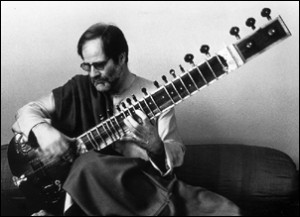 Brian Q. Silver (sitar), after graduating from Harvard College in 1964, went to India under a Fulbright grant to learn sitar with the late Ustad Ghulamhusain Khan of the Indore Gharana (musical tradition). He returned to the U.S. in 1966, continuing his study in subsequent visits to his teacher in India, and has since appeared in concert and in radio and television broadcasts in India, Pakistan, Bangladesh, Dubai, Egypt, Morocco, Dubai, Egypt, Europe, Great Britain, Canada, Central and South America, and throughout the United States. In 1988 he was awarded the honorary title “Khan Sahib” by the All Pakistan Music Conference, and was given that organization’s 1989 gold medal for performance. In 1991, 1996, and 2004, he was recognized for his sitar artistry by the D.C. Commission on the Arts and Humanities and the National Endowment for the Arts.
Brian Q. Silver (sitar), after graduating from Harvard College in 1964, went to India under a Fulbright grant to learn sitar with the late Ustad Ghulamhusain Khan of the Indore Gharana (musical tradition). He returned to the U.S. in 1966, continuing his study in subsequent visits to his teacher in India, and has since appeared in concert and in radio and television broadcasts in India, Pakistan, Bangladesh, Dubai, Egypt, Morocco, Dubai, Egypt, Europe, Great Britain, Canada, Central and South America, and throughout the United States. In 1988 he was awarded the honorary title “Khan Sahib” by the All Pakistan Music Conference, and was given that organization’s 1989 gold medal for performance. In 1991, 1996, and 2004, he was recognized for his sitar artistry by the D.C. Commission on the Arts and Humanities and the National Endowment for the Arts.
Visit: www.surbahar.com
Mrs. Shashi Verma; M.A. (Music), M.A. (Econ)(vocal)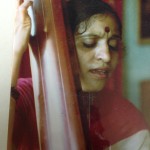
Shashi Verma is an accomplished well known Indian Classical (Hindustani – North Indian) music guru in Maryland, DC and Virginia area. She holds a Master’s degree in Music from University of Rajasthan, Jaipur with second position in order of merit, and distinction in “Sage Performance” and “Music Appreciation and Critical Evaluation.” She has been associated with India School (Bethesda) since 1982, and has been teaching and giving seminars on classical music. She teaches classical and light classical music (one-to-one) privately too. She has accompanied all most all musicians from India on stage in our area. Contact: ShashiVerma101@yahoo.com; 301-262-6140.
Gopika Charan Sinha (vocal)
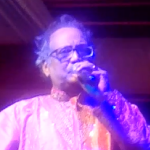 Mr. Sinha is a disciple of Pt. Jagdish Prasad of Patiala Gharana and Ustad Ghulam Akbar Khan (son-in-law of Ustad Nissar Hussain Khan)
Mr. Sinha is a disciple of Pt. Jagdish Prasad of Patiala Gharana and Ustad Ghulam Akbar Khan (son-in-law of Ustad Nissar Hussain Khan)
of Rampur Sahswan Gharana. He is a regular performer of old Hindi Film songs and Bengali Nazrul Songs with full set of
orchestra. He teaches sargams, khayal, light classical at his home in Ashburn.
He is also interested in giving performances on light classical and Hindi film songs. His contact is gopika_sinha@yahoo.com; Phone: 703-994-3541
SoumyaChakraverty (Sarod) plays the traditional Indian fretless stringed lute, or the Sarod. He was initiated into this instrument in his early years and started learning under the guidance of Samarendra Sikdar, a noted Sarodia himself and part of the oldest schools of instrumental music in northern India. Soumyahas trained with his guru for over 31 years and has matured into a senior exponent of this beautiful instrument. In addition to teaching and performing in the true traditional style, Soumya has also collaborated with other forms of Indian and world music, such as Carnatic (South Indian), Flamenco, and modern Jazz. http://www.sarodia.com/soumya_chakraverty


